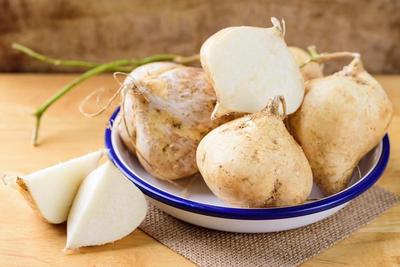🥔 Can Dogs Eat Jicama?
Well Jicama is healthy right? Let’s take a look into this uncommon and mysterious vegetable

Can Dogs Eat Jicama? What You Need To Know
Jicama is an edible root vegetable that can be eaten raw or cooked. It has a crisp texture and sweet flavor similar to water chestnuts. The plant grows in the tropics and subtropical regions of Asia, Central America, South Africa, Australia, New Zealand, Mexico, and parts of Europe. In North America, it’s grown commercially in California and Florida.
The roots have been used for centuries as food by Native Americans and other cultures around the world. They are rich in vitamins A, C, B6, potassium, calcium, iron, magnesium, phosphorus, copper, zinc, manganese, fiber, protein, carbohydrates, antioxidants, essential fatty acids, and more than 50 minerals.
The leaves contain vitamin K, folate, thiamine, riboflavin and niacin. It also contains high levels of dietary fiber which helps lower cholesterol and blood sugar levels. It’s easy to grow from seed indoors or outdoors. Plant seeds directly into your garden after all danger of frost has passed.
Seeds should germinate within 10 days at 70 degrees F. Seedlings will need about 2 weeks before transplanting outside. If you live in zone 7 or warmer, sow them out-doors when soil temperatures reach 60F during the day.

Should I give my dog Jicama
Jicama is one of those vegetables that seems great for us but isn’t necessarily something we think of feeding our pets. But there are many reasons why it should definitely be added to their diet.
First off, it’s super nutritious. It contains lots of vitamins and minerals including vitamin A, B complex, calcium, phosphorus, potassium, magnesium, iron, zinc, copper, manganese, selenium, niacin, riboflavin, thiamine, folate, pantothenic acid, biotin, choline, iodine, and omega 3 fatty acids. In addition, it’s high in dietary fiber which helps promote regular digestion and elimination. And finally, it’s very easy to digest.
The benefits of feeding jicama to dogs
Jicamas have been around since ancient times in Mexico and Central America. They were originally cultivated for use as food but also served other purposes such as medicine and decoration. Today, this root vegetable has become popular among people who want to add some crunchy goodness into their diets. There are many benefits associated with feeding jicama to dogs:
- Rich source of Vitamin C – This nutrient plays a vital role in maintaining healthy skin, bones, teeth, gums, immune system, eyesight, and overall health.
- High Fiber Content - Dietary fiber is important because it keeps our digestive tract clean and prevents constipation.
- Good Source Of Potassium - Potassium is necessary for proper muscle function, nerve transmission, heart rhythm regulation, fluid balance, and acid/base equilibrium.
- Low Sodium Levels - Eating foods low in sodium reduces risk factors for cardiovascular disease.
- Antioxidant Properties - These compounds help protect against free radical damage caused by environmental toxins like smoke, radiation, pollution, pesticides, herbicides, fungicides, insecticides, heavy metals, etc. Free radicals cause cell aging and cancer.
- Nutrient Dense Food For Your Dog - Jicama provides nutrients that are beneficial to both humans and animals alike.
- Easy On The Stomach - Jicama doesn’t require any preparation so there aren’t any added preservatives or chemicals. Plus, it tastes great!
- Tasty Treats That Won’t Make Them Sick - Many dogs enjoy chewing on jicama sticks just like kids do. However, be sure not to give them large quantities of jicama sticks as they might choke on them. Instead, try offering smaller amounts every few hours throughout the day.
High Amount of Antioxidants
Even if this plant is raw or uncooked, dogs can eat it. Raw fruits and veggies contain more antioxidants than cooked ones due to heat processing. So even though jicama may look ugly when cut up, it still offers plenty of nutrition. Your dog may enjoy raw jicama more due to its crunchy texture.

Potentially help with weight loss
Jicama is not known to have any side effects when consumed by humans or animals. It might even help people or pets who suffer from obesity because it helps them feel full longer than other vegetables. However, there are no studies that prove whether consuming jicama could actually cause weight loss in dogs. So, we cannot say for sure how much jicama would benefit your pet. But one thing is certain; eating more fruits and veggies is always better for your dog’s overall health.
Precautions to take when feeding jicama to your dog.
While there are many benefits to feeding jicama to your pet, there are some things that you need to consider first. For starters, make sure that you only give your dog small amounts at one time. If he eats too much at once, his stomach may become bloated and uncomfortable.
Avoid giving him/her any raw foods because these types of items can cause gastrointestinal problems such as diarrhea. Also, don’t feed them anything that isn’t completely fresh. You’ll notice if something looks old or moldy. Lastly, keep an eye on how often they consumes jicama. Don’t let them overeat because then they could get sick.
Conclusion
We highly recommend adding jicama into your dog’s diet. Not only does it taste delicious but also contains a lot of vitamins and minerals which will improve their overall health. Just remember to monitor how frequently your dog ingests jicama and adjust accordingly. We hope our article helped answer all of your questions about what jicama is and why it should be included in your dog’s diet.